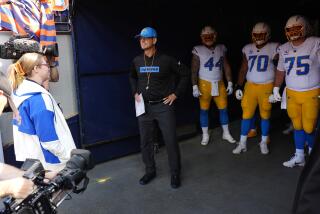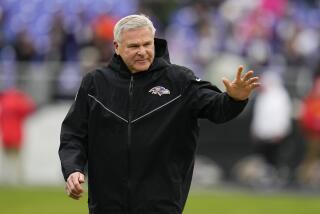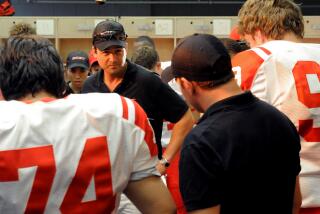Enduring lessons of the mentor on the sidelines
MY son, a former college quarterback, recently told me he has a recurrent dream in which he furiously screams at his coach. For us athletes, the connections between one’s old man and one’s coach are so transparent that I was about to come straight out and ask him if he was mad at me. Instead I simply confided that I have those coach dreams too. In mine, I botch a pass pattern and come back to the sideline to try to explain that the wrong play was sent in, but my coach just folds his arms and turns his back on me. Then I go over and sit on the bench and turn my back on myself.
Our sense of ourselves is bound up in our sense of our bodies, and for many of us our sense of our bodies has been deeply influenced by a guy stalking the sidelines. For a variety of reasons, coaches wield enormous psychological clout in America. Some use their magic to inspirit the lives of their players on and off the field, while others try to install tripwires in the minds of the klutzes who rub them the wrong way.
In “Coach,” Andrew Blauner has strung together an all-star squad of scribblers, each reflecting on someone who, in the course of teaching them a move or a shot, also offered instruction in the game of life. The literati are, of course, inveterate navel gazers, and as such they swing the bat of memory with gusto. Looking 37 years back in the rearview mirror, H.G. (Buzz) Bissinger, the author of “Friday Night Lights,” marvels at his middle school coach, who “never seemed bored, never had that hazy faraway look in his eyes of, Please God
You don’t have to be an ex-jock with a trophy case to find someone you can relate to here. Lauren Slater’s coach is a summer camp counselor who coaxes her into trying to manage the bronco of her moods by learning how to ride horses. Andrew Solomon, who cut his authorial teeth with a book about his melancholy, writes of a personal trainer who helped him renegotiate his wretched relationship with his body. Jane Leavy, who wrote a bestselling biography of Sandy Koufax but never wore a whistle around her neck, tells of being called on to coach her HIV-positive friend Bob through the endgame. “Coaching is about trying,” Leavy writes. “It’s about exhorting and cajoling others to get the most out of their bodies. Mine was a nihilistic task: to give Bob permission not to try, but to let go and let be.”
“Coach” also contains a gallery of traditional portraits by old masters -- such as George Vecsey on Casey Stengel, George Plimpton on golf gurus, Frank Deford’s Picasso-like sketch of Al McGuire; and John McPhee on the Princeton professor of basketball, Coach Willem van Breda Kolff.
The ball of reflection takes some surprising bounces here, but as a whole the book invites us to ponder the nature of the strange ministry of coaching. In his foreword, Van Breda Kolff’s star student, Bill Bradley, puts the ball in the hoop: “Leadership means getting people to think, believe, see, and do what they might not have without you. It means possessing the vision to set the right goal and the decisiveness to pursue it single-mindedly. It means being aware of the fears and anxieties felt by those you lead even as you urge them to overcome those fears. A great coach embodies these qualities and transforms them into a force that can effect powerful changes in those they lead.”
In other words, a good coach is a teacher, therapist, visionary and taskmaster. There are today a plethora of manuals on coaching, replete with sidebars of do’s and don’ts; however, the rich case histories here, some of which are meant to stand as negative object lessons, provide a better and more subtle guide for the perplexed. Whether a base coach in Little League or the head honcho in a Division I program, everyone involved in the process of trying to draw the best out of others ought take a jog through these compelling stories.
*
A former college football coach, Gordon Marino is a professor of philosophy at St. Olaf College.
More to Read
Go beyond the scoreboard
Get the latest on L.A.'s teams in the daily Sports Report newsletter.
You may occasionally receive promotional content from the Los Angeles Times.










